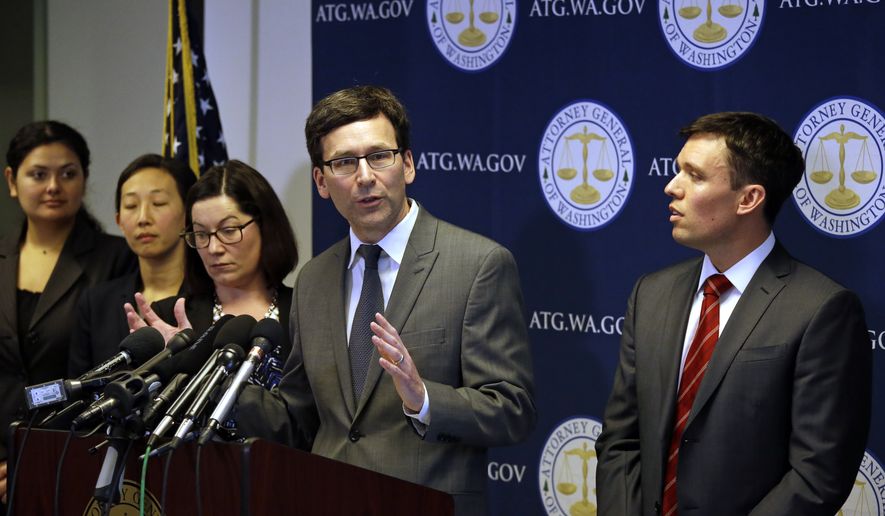Washington state’s attorney general moved ahead Monday with an effort to block this week’s expected implementation of President Trump’s revised executive order on travel and refugees, asking a federal judge to rule that a prior injunction that prevented the first order from being enforced also applies to the new order.
U.S. District Judge James Robart responded by ordering the Trump administration to respond by Tuesday afternoon to the emergency motion to enforce the preliminary injunction, but said he would delay any potential hearing on the matter until Wednesday at the earliest.
The decision means a federal judge in Maryland likely could be the next to consider whether to block the revised order before it is set to go into effect Thursday.
Washington Attorney General Bob Ferguson also filed an amended complaint on Monday, detailing the ways he believes state residents, universities, businesses, health care systems and religious organizations will be harmed by the revised order.
He argued that families would be separated from relatives unable to obtain travel visas, businesses would lose out on revenue from thousands of tourists from the six countries whose entry into the U.S. would be banned, and students and doctors from the affected countries might have to withdraw from university or residency programs amid uncertainty about their visas.
Judge Robart ordered the Justice Department to file a response Tuesday by 7:30 p.m. EST.
Under the new order, signed March 6, visitors from six Muslim-majority countries — Iran, Libya, Somalia, Sudan, Syria and Yemen — will be banned from obtaining visas to come to the United States for 90 days. Iraq was dropped from the original list of banned countries.
The new version still will halt for 120 days all refugee resettlement, though it removed the original order’s permanent ban on refugees from Syria and exemptions for religious minorities, namely Christians.
Judge Robart on Friday declined to rule on whether his prior injunction, which since Feb. 3 has blocked the initial travel ban from being enforced, could be construed to apply to the revised version before an amended complaint addressing the new order was filed.
In the motion to enforce the injunction against the new travel ban, Washington state attorneys wrote that if Trump officials wish to implement the revised order, “they must move to modify this Court’s injunction under well-settled rules.”
“Until they do so, they cannot escape the injunction and continue their illegal conduct,” Washington state attorneys wrote.
Washington has been joined by several other states — California, Maryland, Massachusetts, Minnesota, New York and Oregon — opposing the revised order, which they say is akin to a “Muslim ban.”
While Judge Robart could issue a ruling Tuesday night after being briefed by the Justice Department, his order on Monday makes clear that a hearing in the case would not be scheduled before Wednesday.
In that case, opponents of the revised travel order would get their next crack at it Wednesday morning in a lawsuit brought in Maryland by the American Civil Liberties Union and the International Refugee Assistance Project. That case challenges the constitutionality of the revised order, saying it is too similar to the initial version that was blocked by Judge Robart and was “motivated by the same anti-Muslim purpose.”
“It’s conceivable that he issues an order tomorrow night keeping the injunction in place nationwide,” said ACLU attorney Lee Gelernt, who is involved in the Maryland case.
Whether or not an order is issued Tuesday night, Mr. Gelernt said he expects his case would still receive a hearing because, in addition to the claims raised in the Washington lawsuit, the Maryland case challenges the order’s reduction of the number of refugees the United States would accept this fiscal year. Under the order, the U.S. would accept 50,000 refugees instead of 110,000 refugees, a reduction the ACLU alleged was a violation of the Refugee Act.
In a response in the Maryland case filed Monday, Justice Department attorneys argued that because revisions to the order allow anyone who currently holds a valid visa from the six affected countries to keep it when the order takes affect, that there is no emergency basis for hearing the challenges to the order before it takes effect.
“No immediate upheaval occurs as a result of the new Order taking effect on that date: No visa is revoked. No lawful permanent resident traveling abroad is barred from returning,” DOJ attorneys wrote. “Nobody lawfully in the United States loses any prior ability to leave the country to travel and later return.”
Justice Department attorneys further expounded on their legal defense of the revised ban in a separate case out of Hawaii.
The attorney general in Hawaii filed a lawsuit challenging the ban and is due in court for a hearing in the case at 3:30 p.m. EST. Arguing for a temporary restraining order to prevent the revised order from taking effect Thursday, Hawaii’s attorney general has highlighted the scenario feared by Ismail Elshikh, the imam of the Muslim Association of Hawaii. Mr. Elshikh worries that his mother-in-law, a Syrian national, would be barred from coming to the United States under the travel ban.
DOJ attorneys argued that Hawaii’s claim that individuals would be harmed by the travel ban was “speculative,” noting that neither “Elshikh’s mother-in-law or any other affected relative of a Hawaiian resident has yet sought, much less been denied, a waiver.”
“Until that happens, neither she nor Elshikh has suffered any injury fairly traceable to the Order,” DOJ attorneys wrote in their defense of the revised order.
“There is no basis to restrain the Order in the interim, and certainly no basis to restrain it nationwide,” DOJ attorneys wrote, asking that the temporary restraining order be denied.
• Andrea Noble can be reached at anoble@washingtontimes.com.




Please read our comment policy before commenting.